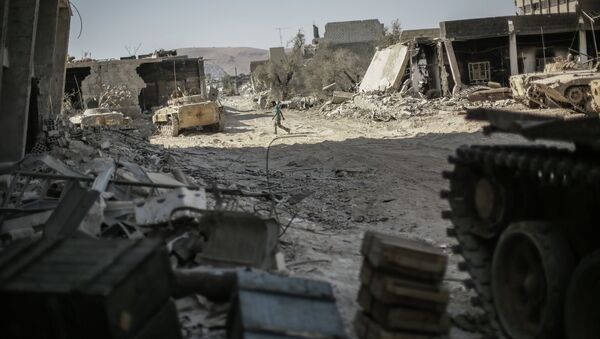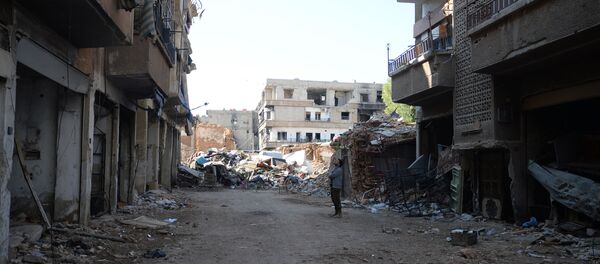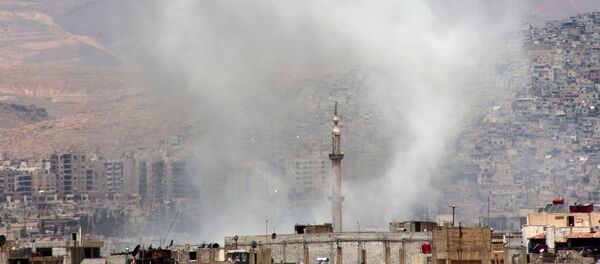The Ghouta chemical attack left a death toll ranging from at least 281 people to 1,729. The attack was the deadliest use of chemical weapons since the Iran–Iraq War.
“Even before the chemical weapons were used in Eastern Ghouta, a video appeared on the Internet showing how the terrorists were using gas to poison rabbits. Militants threatened that they would use this weapon to destroy the Syrian authorities, government’s army and people, all those who support Assad,” Hassan said.
He further said that after that video, there were reports that Saudi Arabia, near the borders of Syria and Jordan, has organized workspace for the production of special chemicals which are necessary to create chemical weapons, to be used by the terrorists.
“After all of that, we witnessed the use of chemical weapons in Khan al-Assal, an Aleppo suburb, where dozens of victims were innocent civilians. It is noteworthy that the media working for public relations of terrorists and financed by the US and its Western allies said that the chemical attack was carried out by the Syrian government’s army against its own citizens.”
“The Syrian government immediately denied this information and said that this was done by the terrorists. The government also demanded an immediate investigation into this terrible incident,” Hassan noted.
The official request of the Syrian authorities to carry out an investigation was reported to the UN Security Council, but surprisingly its examination was delayed by a year and only after that the UN Security Council decided to send its inspectors to Syria.
However, when the OPCW inspectors arrived in Damascus on August 21, 2013, the terrorists in the suburbs of Damascus in Eastern Ghouta once again used the chemical weapons and immediately blamed it on the Syrian Army.
“The Syrian authorities have repeatedly denied these false accusations. The government said that it was the handiwork of the terrorists, since there is no logic, sense and interest to use chemical weapons in such close proximity (5 km) to the location of OPCW inspectors and the United Nations,” Hassan stressed.
According to the correspondent, the results of the investigation and many of the facts were distorted.
“It turned out all wrong. It was not what the Syrian authorities and the Syrian people were hoping to achieve.”
“The terrorists during the meeting admitted that it was they who carried out the chemical attacks in Eastern Ghouta and purposely accused the Syrian government’s army,” Hassan said.
“I would also like to point out that the United States, in turn, said that the use of chemical weapons in Syria is the alleged ‘red line.’ If it is broken, the US will directly attack the Syrian authorities. In fact, all these speculations have become a convenient excuse for the US to prepare what it was intending to do. Nevertheless, due to various reasons the US attacks did not take place.”
The correspondent further said that ultimately, the secret services of the West, particularly the United States, France and England, as well as Saudi Arabia and Israel, used these chemical attacks in pursuit of their own interests and goals.
“They tried to depict everything so that the blame fell on the Syrian authorities. Such a maneuver was needed in order to prepare the political and informational sphere for a direct military intervention,” Hassan explained.
“In other words, it is a tactic of ‘psychological projection’ and ‘proactive action’ to convince the world that they allegedly did not know anything about what was happening and were not involved but are just trying to establish the ‘truth’ by finding the perpetrators of the incident,” according to Hassan.
“While the whole world knows that this was done at their hands, that they are sponsoring and helping terrorists, supplying them with weapons, including chemical weapons, which was applied and used against the civilian population and Syrian citizens,” the correspondent concluded.
According to the Human Rights Watch, the victims of the Ghouta attacks showed symptoms which are consistent with exposure to nerve gas, including suffocation; constricted, irregular, and infrequent breathing; involuntary muscle spasms; nausea; frothing at the mouth; fluid coming out of noses and eyes; convulsing; dizziness; blurred vision; and red and irritated eyes, and pin-point pupils.
This attack prompted Western countries to discuss issuing strikes on Syria. However at that time, due to the diplomatic efforts of Russia, foreign intervention was prevented and an agreement was reached with the Syrian government to destroy all the chemical arsenals.
In September 2013, Syria was acceded to the Convention on the Prohibition of Chemical Weapons, becoming a member of the Organization for the Prohibition of Chemical Weapons (OPCW).





